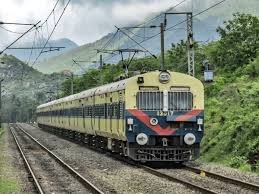In a major step to tackle growing passenger demand and severe overcrowding on Kerala’s railway routes, Indian Railways is set to ramp up Mainline Electric Multiple Unit (MEMU) services across the state. The move comes in the wake of a significant coach shortage and lack of backup rakes, which have frequently disrupted services and left commuters frustrated.
Kerala currently operates 12 MEMU services, but only seven run with the full set of 12 coaches. The rest function with just eight, drastically limiting capacity. Upgrading these to 12-coach rakes could boost capacity from 614 to 921 seats per train. However, a key issue is the absence of spare rakes — any technical glitch results in outright service cancellations.
In the Palakkad Division, reduced sleeper coaches in long-distance trains like the Kannur-Yesvantpur Express have compounded travel woes. The number of D-reserved coaches has been slashed, forcing passengers to jostle for space, especially during overnight journeys.
To address these bottlenecks, Southern Railway is investing ₹44.36 crore to expand the MEMU shed in Kollam. The upgrade will allow maintenance of 16-car rakes, up from the current capacity of nine. This expansion is expected to enhance train frequency, particularly on the overcrowded Thiruvananthapuram–Ernakulam corridor.
The Palakkad MEMU shed, operational since 2011, also continues to be a vital hub for rake maintenance in North Kerala.
Public pressure has been mounting for more MEMU services, especially as road traffic worsens due to ongoing highway projects and rising bus fares. Responding to commuter concerns, Kerala’s Transport Minister V. Abdurahiman has urged the Railway Board to deploy additional coaches for the Venad Express and introduce a new MEMU service between Kollam and Ernakulam.
He emphasized the hardship faced by daily passengers, especially during holiday rushes, and called for immediate action.
With strategic infrastructure upgrades and policy interventions underway, Indian Railways is aiming to restore reliability and comfort to Kerala’s busy rail network. For thousands of daily passengers, this could signal an end to cramped carriages and unpredictable journeys — and the beginning of a more efficient, commuter-friendly railway experience.




